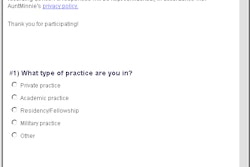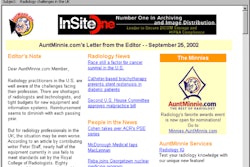When imaging administrator Rob Sherrill decided to go back to school for a master’s degree in business administration (MBA) in 1982, the pickings were slim. He chose a program at the University of Idaho in Moscow because it was close by and actually offered night classes. Weekend programs were unheard of then.
At the time, Sherrill was a radiologic technologist with an associate’s degree and 10 years of work experience. While he wasn’t the only healthcare professional in the program, it was your standard MBA program versus one geared toward his area of expertise.
But it was a worthwhile investment, said Sherrill, who is now the director of radiology operations for the Mayo Clinic in Jacksonville, FL.
"By the end of the mid-80s, if I was even going to continue to hold the position I had (at that time), an advanced degree would have been to my advantage," Sherrill said. "Today, there’s such a wide variety of (MBA) programs available that there’s no excuse."
In the past 15 years, the number of executive MBA programs has skyrocketed. According to the Official MBA Guide, 294 of the numerous MBA programs in the U.S. and Canada are tailored for healthcare professionals.
One major reason for this growth is increasing demand for administrators with the right kind of business acumen. Work experience alone may not be enough as employers are specifically asking for candidates with advanced educational backgrounds.
"For certain jobs, in particular (those) that have to do with marketing, they want someone that’s got an MBA," said Tom Bogle, a managing partner at Tom Bogle and Associates, a healthcare executive search consulting firm in Palm Springs, CA.
One of Bogle’s current clients wanted an MBA in order to become more market savvy. "There’s huge concern in the medical industry with the changing market. Where is it going? What should you be doing? Where should you be spending your money? (People) want to depend much more on the data that they get, rather than just ‘doing things’ and hoping to be successful," he said.
So does that mean an administrator has to drop everything and enroll full-time in the nearest MBA program? Not necessarily. Many programs are designed to accommodate a working professional’s schedule. The following are some general guidelines to help determine if earning an MBA is in your future.
Are you experienced?
Although applications are reviewed on a case-by-case basis, most executive MBA programs expect candidates to have put in at least 3-5 years in the healthcare industry. Experience can be "shared and discussed and used as an anchor point (in the classroom)," said Rodney Alsup, the senior associate dean for graduate business programs at Kennesaw State University in Kennesaw, GA.
Most healthcare MBA programs expect an applicant to take the graduate management admission test (GMAT) if he or she does not already hold another advanced degree. Students without bachelor’s or associate’s degrees are rarely considered by MBA programs.
Some programs do require an applicant to have some background in statistics and accounting. Others offer these core classes, prior to the start of the executive MBA program, for additional tuition.
Don’t quit your day job
While it may initially seem that full-time students have an edge over part-timers, that’s not necessarily the case in healthcare MBA programs. A full-time student may be able to devote more of their attention to their course work, but they generally come into the program with less real-life experience, according to William Aaronson, an associate professor of healthcare management in the department of risk, insurance, and healthcare management at the Fox School of Business and Management in Philadelphia.
For those who want to pursue an MBA while continuing with their day jobs, programs with after-work or weekend courses are the best bet.
Weekend executive MBA programs generally meet for a week-long, on-campus stint at the outset of the program, and then meet one or two weekends a month, from Thursday or Friday through Sunday, until the class has fulfilled its degree requirements. Often, these programs have one or two other longer visits scattered through the course schedule.
Regular MBA programs attended on a part-time basis can take from 3-5 years; executive MBA programs are more compact, requiring a 2-3 year commitment.
Class mixer
It seems natural that many executive MBA candidates will lean toward an MBA program that’s geographically nearby. Most students favor institutions near their home bases. As expected, the healthcare MBA program at the University of California, Irvine sees mostly west coast applicants, while Baldwin-Wallace College in Berea, OH, attracts students from the northeast.
But building diversity is important to admissions officers, which could potentially factor into who is accepted where. Diversity helps students recognize the multiple professionals that must work together in healthcare organizations and provides a classroom setting that teaches teamwork and team management.
"Our original concept (for a class) is that we would very much like to have a physician, a nurse, some type of laboratory person, some type of administrative person, and the fifth person would be the information technology person," Alsup said.
The bottom line
There’s no getting around it: An executive MBA program can be costly. Some programs can cost as much as $60,000 a year in tuition alone, not to mention add-ons such as transportation or even living costs for a program away from home. Unfortunately, "healthcare organizations have traditionally not been responsive to sponsoring 100% of a graduate degree program," Alsup said.
That’s a bit of a catch-22, because these same organizations are actively seeking candidates with the right kind of business background. Mary Bass, a Houston-based executive recruiter specializing in healthcare for executive search firm Spencer Stuart of Chicago, said that healthcare companies are waking up to the new economy.
"This is a world that is bottom-line focused," she said. "If it’s not profitable, it’s not going to survive. They need to have a business perspective to make healthcare work."
But for others like Sherrill, who shouldered the financial burden of earning an MBA, the rewards have been manifold. Alice Toth, the director of systems standardization and data research at Sisters of Saint Francis Health Services in Mishawaka, IN, said that her MBA "opened up a million doors. I went right from the hospital level straight up to working on the corporate level. They employed me two weeks before my MBA was done, and I finished that, went to work, and received two more promotions after that in just the last three years."
And getting an MBA might help you weather today’s less-than-sunny economic conditions, according to Bass. "Right now, with the soft economy, it’s a good time for people to fully equip their skill set," she said.
By Leslie FarnsworthAuntMinnie.com contributing writer
July 15, 2002
Related Reading
Components of a successful training program, April 24, 2002
RTs are hired for skills, not diplomas, February 22, 2002
More students enrolling in radiologic science programs, January 29, 2002
Educational investment pays off in the radiology workplace, November 9, 2001
RT updates: JRCERT extends deadline; CSRT ponders representation, October 31, 2001
RT educators protest higher education requirements, October 8, 2001
Copyright © 2002 AuntMinnie.com



















